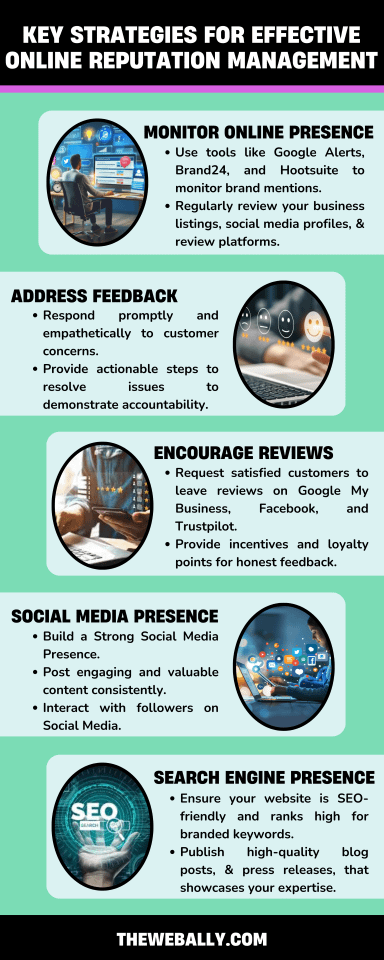In today’s digital age, a business’s reputation can be made or broken with a single online review, social media post, or news article.
Reputation management online involves monitoring, influencing, and maintaining how a brand, business, or individual is perceived in the digital world.
With the internet providing consumers with a platform to voice their opinions, online reputation management (ORM) is essential for businesses to build trust, attract customers, and ensure long-term success.
This article explores the importance of ORM, effective strategies, tools, and common challenges businesses face in safeguarding their online reputation.
What is Online Reputation Management (ORM)?
Online Reputation Management refers to the practice of monitoring and managing your digital footprint to shape public perception of your brand.
It includes:
- Tracking mentions of your brand across online platforms, including reviews, social media, and news sites.
- Addressing negative feedback proactively to minimize damage.
- Promoting positive content to enhance brand image.
- Engaging with your audience to build trust and loyalty.
Why Online Reputation Matters
- Trust and Credibility: A strong online reputation builds consumer trust. Studies show that 90% of customers check reviews before purchasing a product or service.
- Customer Decision-Making: Positive reviews and feedback significantly influence buying decisions.
- Search Engine Rankings: Google and other search engines favor businesses with good reviews and a positive online presence, improving your visibility.
- Crisis Mitigation: Proactively managing your reputation allows you to address issues before they escalate into crises.
- Business Growth: A stellar reputation attracts partnerships, investments, and loyal customers.
Key Strategies for Effective Online Reputation Management

1. Monitor Your Online Presence Regularly
- Use tools like Google Alerts, Brand24, and Hootsuite to stay updated on mentions of your business.
- Regularly review your business listings, social media profiles, and review platforms like Yelp or TripAdvisor.
2. Address Negative Feedback Proactively
- Acknowledge Complaints: Respond promptly and empathetically to customer concerns.
- Offer Solutions: Provide actionable steps to resolve issues to demonstrate accountability.
- Learn from Criticism: Use negative feedback as a learning opportunity to improve your offerings.
3. Encourage Positive Reviews
- Request satisfied customers to leave reviews on platforms like Google My Business, Facebook, and Trustpilot.
- Provide incentives such as discounts or loyalty points for honest feedback.
- Showcase glowing testimonials on your website and marketing materials.
4. Build a Strong Social Media Presence
- Post engaging and valuable content consistently.
- Interact with followers by responding to comments and messages.
- Use social media listening tools to identify and address concerns before they escalate.
5. Optimize Your Search Engine Presence
- Ensure your website is SEO-friendly and ranks high for branded keywords.
- Publish high-quality blog posts, press releases, and other content that showcases your expertise.
- Build backlinks from reputable sources to improve domain authority.
6. Crisis Management Plan
- Develop a strategy for handling negative press or viral complaints.
- Appoint a dedicated team or individual responsible for addressing crises.
- Stay transparent and communicate clearly during challenging times.
7. Highlight Corporate Social Responsibility (CSR)
- Share your community involvement, charitable initiatives, and eco-friendly practices.
- Align with causes that resonate with your target audience to enhance goodwill.
8. Invest in Reputation Management Tools
- Reputation.com, BirdEye, and Podium are advanced platforms that help manage and improve your online reputation.
Challenges in Online Reputation Management
- Managing Fake Reviews: Dealing with false or malicious reviews that damage credibility.
- Staying Updated: Keeping track of mentions across multiple platforms can be overwhelming.
- Responding Quickly: Delayed responses to negative feedback can exacerbate issues.
- Maintaining Consistency: Ensuring a unified tone and message across all online interactions.
The Role of ORM in the Future of Digital Business
As businesses increasingly operate online, the importance of ORM will continue to grow.
Emerging trends, such as AI-driven review platforms, enhanced analytics, and greater customer awareness, will demand a proactive and sophisticated approach to reputation management.
Conclusion
Reputation management online is no longer optional—it’s a fundamental part of running a successful business in the digital world.
By actively monitoring your online presence, engaging with your audience, and addressing issues promptly, you can build a strong, positive reputation that drives customer loyalty and business growth.
Remember, in the digital era, your reputation precedes you, and managing it effectively is the key to thriving in a competitive landscape.
If you need help with your website design, social media accounts or digital marketing services including SEO, The Web Ally is here to help. Contact us for more details.
